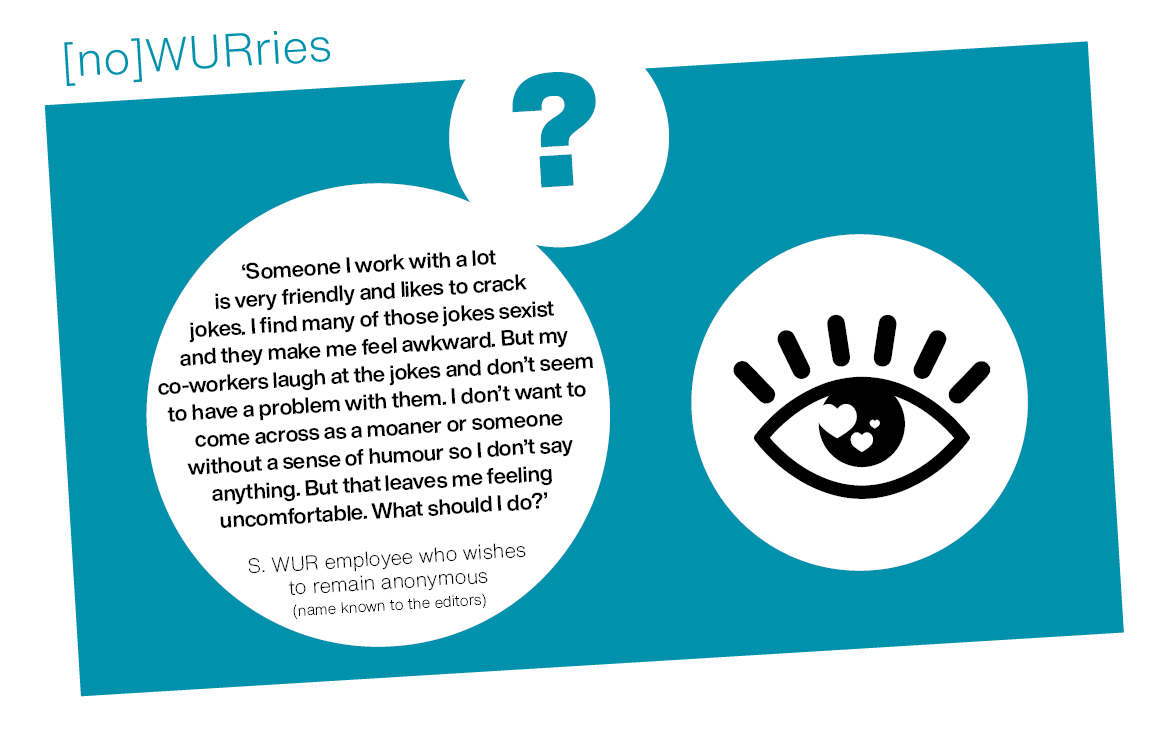Team discussion
‘People are often not aware that there’s another side to jokes. The quickest way to make your colleague aware of it is to have a conversation with them. But that’s not always easy. You could approach your line manager for support. He or she could take the lead and start a conversation with the whole team about how jokes are experienced, without focusing specifically on you or that colleague. That’s a way for you to explore together where people’s boundaries lie, and everyone can learn to respect them. It is easier to speak up about boundaries after such a discussion.’
Anke van Oostveen, confidential advisor
Snowball effect
‘Talk this over with a colleague you trust. Encourage each other to say something about this together if something like that happens again. Then you create a snowball effect. Also, plan in moments with colleagues when such problems can be raised in the group, without mentioning specific cases. For more advice about this “from bystander to ally” effect, you can consult the corporate social workers or the student psychologists.’
Margreet van der Burg, assistant professor of Gender Studies and leader of the EU GenderSMART project
Explain please
‘Next time your colleague makes a sexist or embarrassing joke, ask them to explain it. This way you give your colleague the benefit of the doubt (did they really mean it the way it seemed to you?) And more importantly, your question might make them think more about the content of the joke and realize it is not appropriate. It might trigger a discussion but try not to react defensively: that nullifies your main message. In addition, inform Human Resources about the unpleasant situation. Others might follow, or even have preceded you. Together we can change things.’
Eugenia Leon Alvarado, Communication advisor in the Department of Social Sciences
More awareness
‘Unfortunately, I have been in a similar situation. You not only have to deal with the discomfort of the comments, but also with the fear, guilt feelings and further discomfort of potentially confronting the person or raising the issue with a supervisor and facing the backlash that could come with it. The question should not be “What to do in such circumstances?”, but rather “What are we as a university doing to prevent such situations from occurring?” I would like to call on the university to create more awareness about this type of behaviour. It should never occur in the first place and should not be tolerated.’
Ann Barber, PhD student in Quantitative Veterinary Epidemiology
[next]WURry: How to manage money ánd social life?

Do you have advice or tips for this WURrier? Or could you use some good advice yourself? Email your tips or your question (100 words max) by 26 October to resource@wur.nl, subject noWURries.


![[no]WURries: Summer fun](https://www.resource-online.nl/app/uploads/2022/07/noWURries_online_1620_UK.png)
![[no]WURries: Moving](https://www.resource-online.nl/app/uploads/2022/06/noWURries_online_1619_UK.png)
![[no]WURries: Hangover](https://www.resource-online.nl/app/uploads/2022/03/noWURries_online_1613_ENG.png)